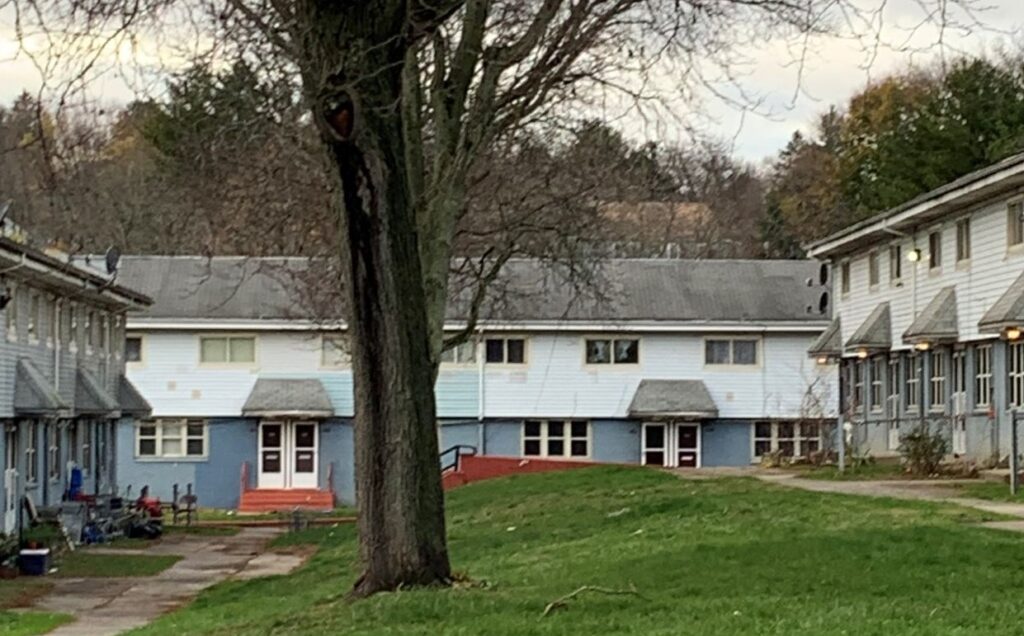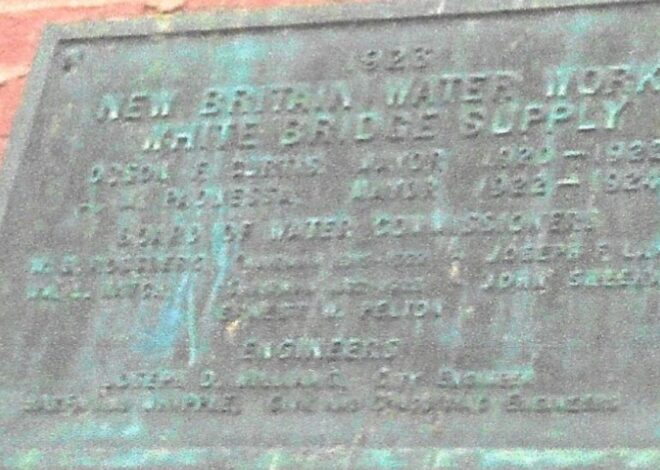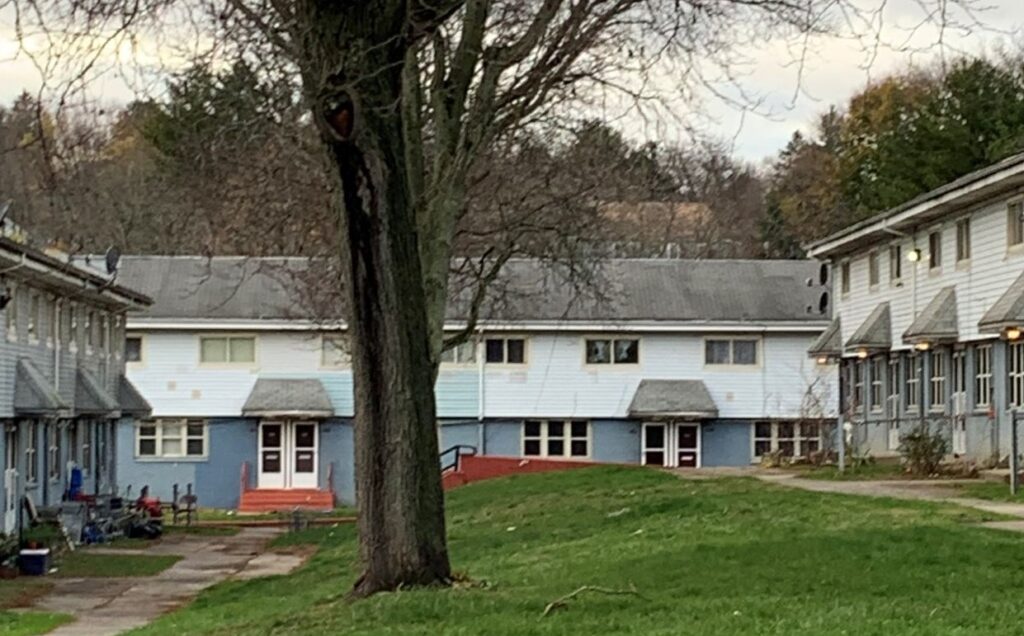
Staff Reports | News Analysis
A March 7th hearing will be held at the New Britain Housing Authority (NBHA) on “significant amendments” to the Authority’s 2023 annual plan that include the demolition and redevelopment of the aging Mount Pleasant family housing complex on Myrtle Street.
With an approval from the U.S. Department of Housing and Urban Development (HUD) this year the Authority is expected to rapidly move ahead with the razing of 81-year old Mount Pleasant that provides 188 homes for low-income and working families. Mount Pleasant includes 28 one-bedroom, 70 two-bedroom, 62 three-bedroom, 26 four-bedroom and 2 five-bedroom units. The amended plan would replace 188 residences with 180. Housing for 63 elderly and disabled persons (one bedroom) at adjacent Bond Street would be replaced one for one.
Like many other housing authorities, NBHA is utilizing the federal Rental Assistance Demonstration (RAD) Program that was established in 2012 to renovate or replace public housing too costly to maintain and modernize. While replacement of the World War II era housing in the Myrtle Street corridor is not in dispute, demolition and the time required for replacement housing poses questions concerning the future of current residents or others who are eligible for subsidized housing. That comes at a time when rental prices are soaring and the availability of affordable housing is very low in the city. (CT Insider, December 2, 2022)
The NBHA informed Mount Pleasant residents last year that it plans “to demolish the existing buildings.” The federal RAD program, according to a Fact Sheet “allows public housing authorities to ‘convert’ public housing subsidy into a Section 8 subsidy that is tied to the property.”
Last October the NBHA board authorized the submission of a RAD application to HUD. The authority engaged the services of New Haven-based Censere Consulting and its CEO Jimmy Miller to work with NBHA Executive Director John Hamilton on the RAD process. Miller reported to the board that he conducted two well-attended meetings with residents — a HUD requirement for the RAD application. “Their (residents) questions were well thought out with many concerned with relocation,” Miller was quoted in the board minutes. “I didn’t promise anything I couldn’t deliver which made it a positive meeting.”
The NBHA’s notifications are assuring tenants that they will be guaranteed support for housing through the use of vouchers (such as section 8s) during and after development of Mount Pleasant. “NBHA’s plans to transform its aging public housing will rely heavily upon the increased use of Housing Choice Vouchers,” according to the annual plan revision, “which will assist with short-term relocation and permanent housing options for families. NBHA will continue to use project-based vouchers in its new affordable housing as HUD aggressively implements its RAD program nationwide.”
While the Fact Sheet says that, under the RAD program, “public housing units must be replaced one-for-one, with limited exceptions,” those exceptions can include “units to be eliminated that have been vacant for 2 or more years, permits up to 5% reduction in total affordable housing units, and allows housing units to convert to community space for services.”
The Fact Sheet says “such reductions are rare,” but the information being given to residents does not appear to identify what the exact plans are for the “redevelopment” of the Mount Pleasant neighborhood.
The Housing Authority did say that Mount Pleasant “is in dire need of redevelopment,” saying that,
Parking areas are limited due to lack of available space. The trash dumpsters are in the parking lots. The layout of the buildings does not promote safety and security is not integrated into the surrounding neighborhood. Much of the site is wasted due to poor site design. In addition, there is a lack of green space and play area for the children.
Through the years Mount Pleasant has fallen into disrepair and the Housing Authority itself has been criticized for not attending to the upkeep of the neighborhood. The RAD program being utilized by NBHA “allows public housing agencies to leverage public and private debt and equity in order to reinvest in the public housing stock. HUD says RAD “is critical given the backlog of public housing capital needs – estimated at over $35 billion” across the nation.
A specific plan for the re-development of Mount Pleasant can be expected once demolition is approved. Affordable housing advocates will be urging the housing authority to provide alternatives for current tenants and to maintain or develop affordable housing that can meet an increasing demand for rentals that low- and fixed income people can afford.
Republican Mayor Erin Stewart recently wrote a letter to the Housing Authority Board she appointed, calling the redevelopment “long overdue.” Stewart implied that more upscale development of the Myrtle Street area would be impeded with, “Mount Pleasant as the eyesore of the neighborhood.” Stewart said.
New Britain has seen a historic amount of development in the last few years, including the recent announcement of the complete renovation of 480 Myrtle Street to the Burritt Industrial Living Apartments. This project is right across the street from Mount Pleasant, and will only continue to beautify this area. Future developments in the Myrtle Street corridor projected over the next 5 years will leave Mount Pleasant as the eyesore of the neighborhood, something we cannot stand for.
In the letter, Stewart said she supports, “affordable housing,” saying that it is, “our vision to keep New Britain affordable while improving our housing stock.” Stewart added that, “The quality of units at Mount Pleasant show us the dire need to invest in the housing infrastructure.”
The Stewart Administration has been credited with a flurry of new housing developments creating hundreds of units in the last year in downtown and inclusive of Myrtle Street. Developers have received generous 13- to 26-year tax abatements to build in the city. All of the projects, however, are being built for market rate rentals and do not include affordable units.
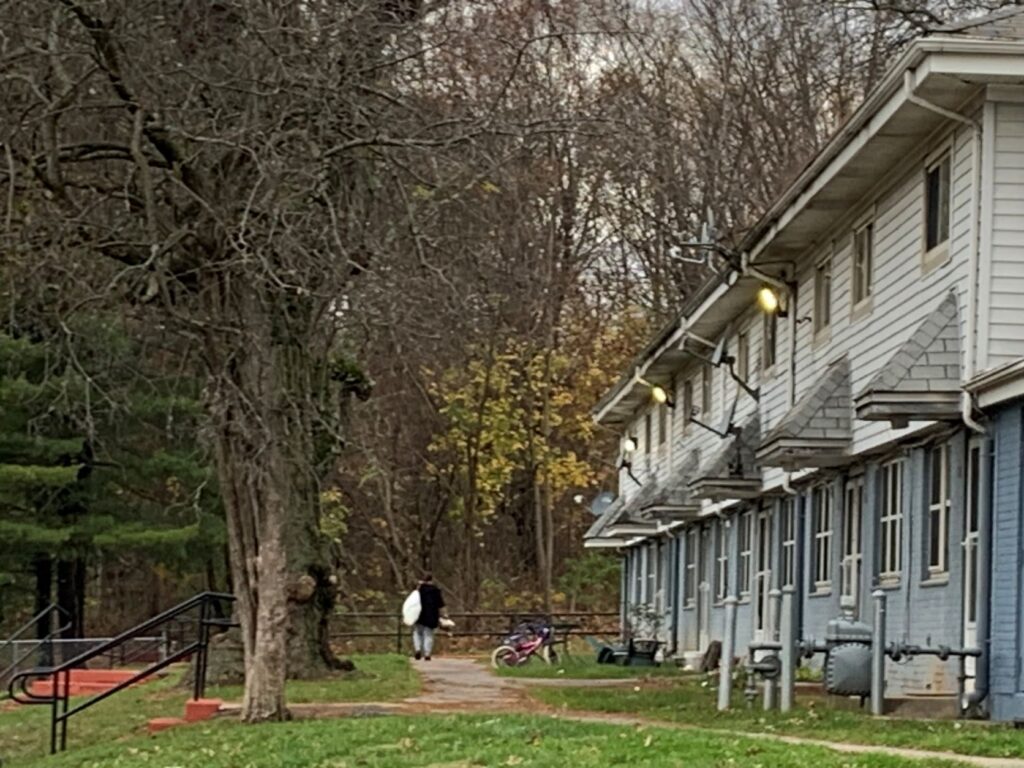
The Housing Authority says it plans to use the RAD program to accomplish changes and to replace family housing for eligible residents. The Fact Sheet it is distributing says that:
Public housing properties across the country need billions of dollars to pay for the repair of broken systems or replacement of outdated appliances. Public housing authorities (PHAs) do not have enough money to keep their public housing properties in good condition and make the necessary repairs. … RAD was created to allow PHAs to access additional sources of funding to maintain, repair, and replace public housing properties.
But a lot about how the “redevelopment” would impact residents appears to be left to the details of how it is actually planned and carried out by officials in New Britain. Details of what will be built at the Mount Pleasant site will emerge once the NBHA entertains private partners for the development.
The Housing Authority does say that “redevelopment of the site is expected to include new infrastructure, green space, streets, community center. etc.” But the Fact Sheet it is distributing noted that the RAD program would allow the Housing Authority to change ownership of the neighborhood to a non-profit organization, and that, “As with some public housing properties today, the [Housing Authority] may partner with another company, including a for-profit, to manage the property day-to-day.”
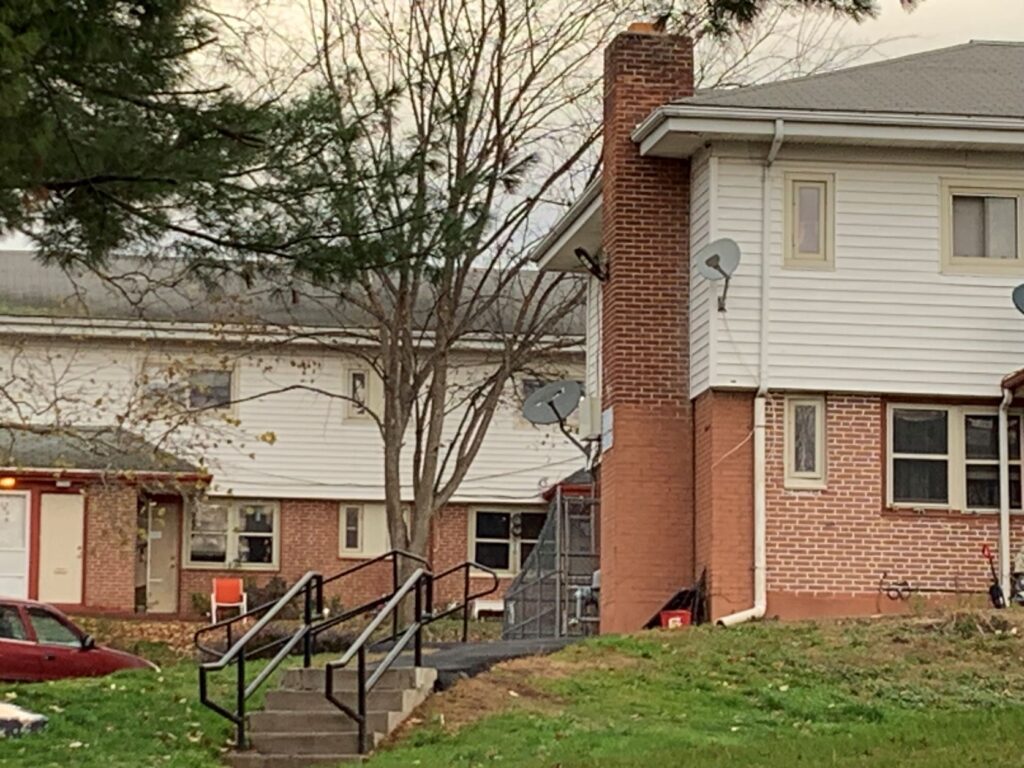
In addition, in a message being distributed to Mount Pleasant residents, the Housing Authority appeared to open up the possibility that people who presently live at Mount Pleasant could be moved to other locations. “Your post-construction home may be a different unit than your current home,” the Housing Authority saying that if, “the plans involve the transfer of rental assistance to a different site … you may need to move to the new site to keep your rental assistance if it is within a reasonable distance of your current home).”
The Housing Authority said it “is desirous of replacing this Project with one that provides housing of choice.” But the Housing Authority assures residents that, “you still have a right to an assisted unit,” and that, “RAD program rules require us to ensure that anyone who wants to return can do so.” It also says that the program allows residents the possibility of applying for Section 8 certificates for housing in privately owned apartments.
Mount Pleasant currently “consists of 24 buildings, including a community center and office building, which houses the NBHA administrative offices and maintenance and storage facilities.”
The NBHA will receive public comments on its annual plan on March 7, 2023 at 3 p.m. at the Jane Johnson Community Room, 18 Armistice Street, at the Mount Pleasant complex.
Editor’s note: Based on available public information at the time, earlier news analysis in this article raised questions about a risk of displacement of Mount Pleasant residents and others eligible for publicly subsidized housing, at least temporarily. While the New Britain Housing Authority has since emphasized that all residents of Mount Pleasant will be able to return to the Mount Pleasant after construction, something the original reporting noted, the Housing Authority still does does not appear to have provided information about the specifics of its plans for the development to allow transparency about this major project. But, the article was updated to be more circumspect on this point.

